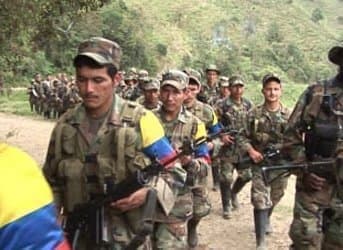After a lull since 2008, the Revolutionary Armed Forces of Colombia have resumed attacks on Colombia’s oil infrastructure, launched 14 attacks this year alone on a major pipeline run by Ecopetrol SA (ECOPETL), which carries about 70,000 barrels a day of crude to the Caribbean coast.
Output declined by 4.8% from January to February as a result of attacks, while the latest attack on 18 March forced ECOPETL to shut down the 771-kilometer pipeline to make repairs. The day before, FARC guerillas reportedly killed 11 soldiers guarding a roadway in the eastern province of Arauca.
Colombian officials say the rise in attacks reflects the desperation of the FARC. Sam Logan is the founder of Southern Pulse, a Latin America-focused consulting firm that tracks and documents FARC’s movements and capabilities. Logan told Oilprice.com that while he does not believe that the recent attacks represent a resurgence of the FARC, he is also cautious about referring to the incidents as a reflection of the group’s “desperation”.
In response to the 18 March attack, Colombian security forces undertook bombing raids on FARC camps in the departments of Arauca and Meta, where the country’s oil production is concentrated. This is also a FARC stronghold and where it enjoys a degree of local support.
“The leadership of the FARC is under ‘Timochenko’ is located in eastern Colombia. Bombings on pipelines in this area reflect the strength of the FARC in that part of Colombia. I'm not convinced the bombings could be seen as a resurgence in strength of the organization as a whole,” Logan told Oilprice.com
At the same time, he cautions against the government’s take on the situation. “The FARC are on the ropes, but I would not use the word desperate. This organization has been around for over 40 years; if anything, it is resilient. Though the insurgency is no longer strong enough to threaten the State, it will likely retain enough strength to effectuate disruption at the local level for many years to come.”
The increased attacks on Colombia’s oil infrastructure also come at an interesting time in the country’s regional relationship dynamics. Reports have begun to emerge recently that Colombia is considering oil pipeline, exploration and production ventures for ECOPETL with Venezuela. The two countries are discussing a possible oil pipeline that would connect Colombia’s Pacific coast with Venezuela and a natural gas pipeline that would deliver Venezuelan gas through Colombia to Central America.
It is a significant development that reflects diplomatic changes since Juan Manuel Santos took over from Alvaro Uribe as Colombia’s president. While Uribe had been highly critical of Venezuelan leader Hugo Chavez, Santos is seeking engagement. But this prompts questions that concern FARC. Uribe had long accused Chavez of harboring and supporting FARC rebels.
Improved relations between Colombia and Venezuela, and in particular an integrated energy infrastructure could provide additional impetus to fight FARC, which would find less support in Venezuela if the latter had a vested interest in Colombia’s energy infrastructure.
Will improved relations and energy security between Colombia and Venezuela translate into increased security for pipelines, facilities and personnel of international oil companies? Not necessarily.
“Pipeline security often begins with the owners of the pipeline,” Logan told Oilprice. “The government gives the concession and washes its hands.”
By way of example, Logan pointed out that in the late 1980s, British Petroleum (BP) hired people to train Colombian policemen in the art of pipeline security. “The Colombian military has protected pipelines in the past, but most of the examples I can think of were of Colombian petroleum company pipelines.
If Colombia and Venezuela move forward with their pipeline plans, ownership of the pipelines will largely determine security. If Venezuela’s PDVSA [Petróleos de Venezuela, S.A.] owns the pipelines, Logan said, “then I doubt FARC or ELN will attack.”
ADVERTISEMENT
On a political level, the pipeline deals could also be dangerous for Santos, he said. “If Chavez controls pipeline’s security, Santos’ detractors may claim some sort of collusion [in the event of an attack]. It’s not likely, but the political exposure is less than ideal.”
By Charles Kennedy


















